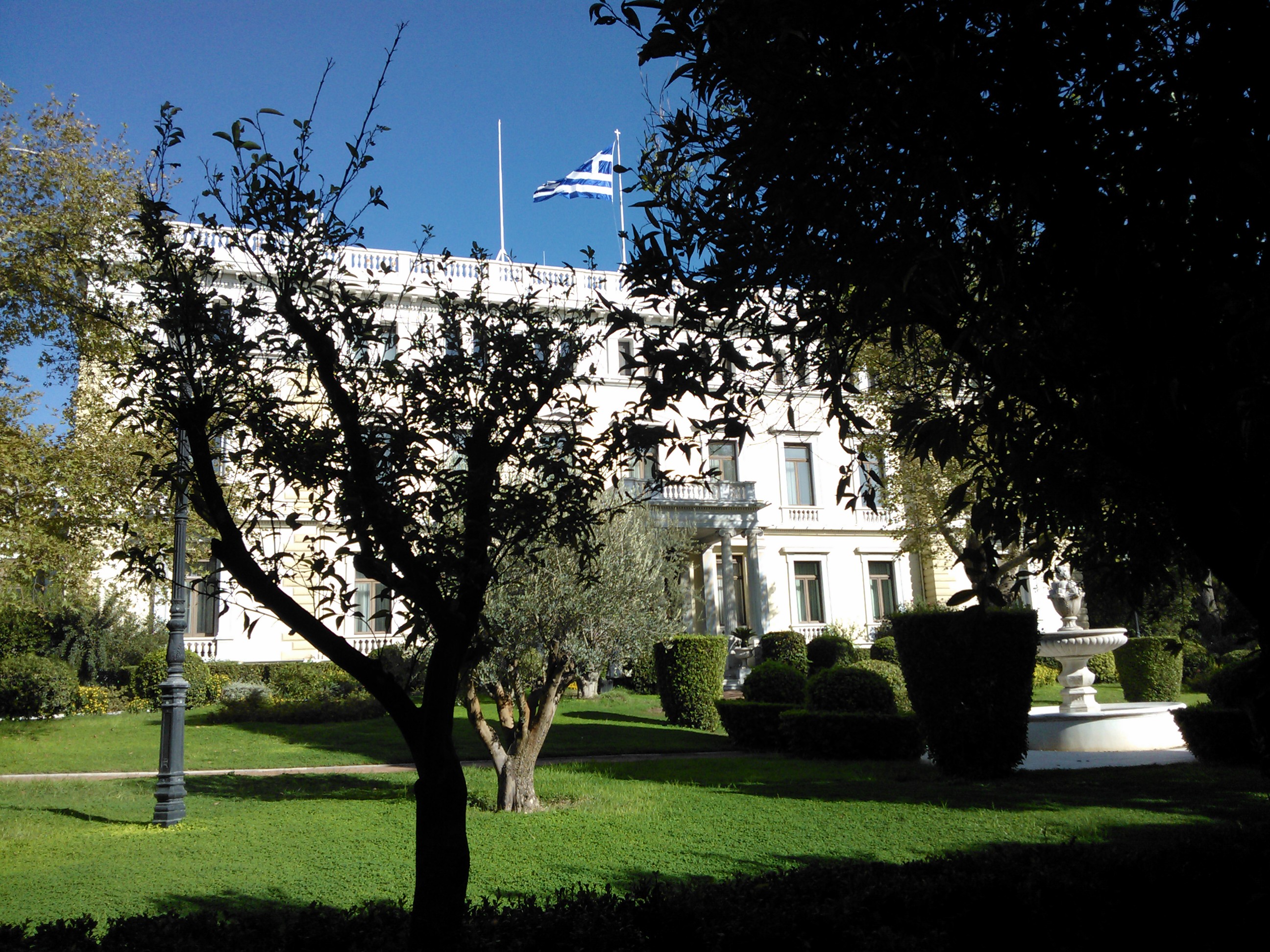|
1978 In Greece
{{Greece-hist-stub ...
The following lists events that happened during 1978 in Greece. Incumbents * President – Konstantinos Tsatsos * Prime Minister – Konstantinos Karamanlis Events * 20 June – The 6.2 Thessaloniki earthquake affected Central Macedonia with a maximum Mercalli intensity of VIII (''Severe''), causing 45–50 deaths and 100–220 injuries. Births * 25 June – Virginia Karentzou, artistic gymnast References Years of the 20th century in Greece Greece 1970s in Greece Greece Greece,, or , romanized: ', officially the Hellenic Republic, is a country in Southeast Europe. It is situated on the southern tip of the Balkans, and is located at the crossroads of Europe, Asia, and Africa. Greece shares land borders ... [...More Info...] [...Related Items...] OR: [Wikipedia] [Google] [Baidu] |
President Of Greece
The president of Greece, officially the President of the Hellenic Republic ( el, Πρόεδρος της Ελληνικής Δημοκρατίας, Próedros tis Ellinikís Dimokratías), commonly referred to in Greek as the President of the Republic ( el, Πρόεδρος της Δημοκρατίας, Próedros tis Dimokratías), is the head of state of Greece. The president is elected by the Hellenic Parliament; the role has been mainly ceremonial since the 1986 constitutional reform. The office was formally established by the Constitution of Greece in 1975, but has antecedents in the Second Hellenic Republic of 1924–1935 and the Greek junta in 1973–1974 which predated the transition to the current Third Hellenic Republic. The incumbent, since 13 March 2020, is Katerina Sakellaropoulou. Powers The president is the nominal commander-in-chief of the Greek Armed Forces and occupies the first place in the country's order of precedence. Although the Greek Constitution of 1 ... [...More Info...] [...Related Items...] OR: [Wikipedia] [Google] [Baidu] |
Konstantinos Tsatsos
Konstantinos D. Tsatsos ( el, Κωνσταντίνος Τσάτσος; July 1, 1899 – October 8, 1987) was a Greek diplomat, professor of law, scholar and politician. He served as the second President of the Third Hellenic Republic from 1975 to 1980. Life He was born in Athens in 1899. After graduating from the Law School of the National and Kapodistrian University of Athens in 1918 he joined the diplomatic corps. After completing his doctoral studies (1924–1928) in Heidelberg, Weimar Republic Germany, he returned to Greece where he became a professor of law in 1933. In 1940, he was arrested and exiled for opposing the 4th of August Regime under Prime Minister of Greece Ioannis Metaxas. During the Axis occupation of Greece during World War II, Tsatsos participated in the Greek Resistance and then he fled to the Middle East, where the exiled Greek government was seated. After the end of World War II, in 1945 he returned to Greece and entered politics and became ministe ... [...More Info...] [...Related Items...] OR: [Wikipedia] [Google] [Baidu] |
Prime Minister Of Greece
The prime minister of the Hellenic Republic ( el, Πρωθυπουργός της Ελληνικής Δημοκρατίας, Prothypourgós tis Ellinikís Dimokratías), colloquially referred to as the prime minister of Greece ( el, Πρωθυπουργός της Ελλάδας, Prothypourgós tis Elládas), is the head of government of the Hellenic Republic and the leader of the Greek Cabinet. The incumbent prime minister is Kyriakos Mitsotakis, who took office on 8 July 2019 from Alexis Tsipras. The officeholder's official seat (but not residence) is the Maximos Mansion in the centre of Athens. The office is described in the Constitution either as Prime Minister or President of the Government (Πρόεδρος της Κυβερνήσεως). This is the reason why the prime minister is also addressed as "Mr/Madam President". Election and appointment of the prime minister The prime minister is officially appointed by the president of Greece. According to Article 37 of t ... [...More Info...] [...Related Items...] OR: [Wikipedia] [Google] [Baidu] |
Konstantinos Karamanlis
Konstantinos G. Karamanlis ( el, Κωνσταντίνος Γ. Καραμανλής, ; 8 March 1907 – 23 April 1998), commonly Anglicisation, anglicised to Constantine Karamanlis or just Caramanlis, was a four-time prime minister and List of heads of state of Greece#Third Hellenic Republic (since 1974), twice as the President of Greece, president of the Third Hellenic Republic, and a towering figure of Greek politics, whose political career spanned much of the latter half of the 20th century. The longest serving Prime Minister of modern Greek history (c. 14 years), during his first term (1955-1963) he applied a program of rapid industrialization, heavy investment on infrastructure and improvement on agricultural production, which led to the post-war Greek economic miracle. He also implemented the extension of full women's suffrage, voting rights to women, which had stood dormant since 1952. In his second term, after 1974, he is recognised for his successful restoration of Democ ... [...More Info...] [...Related Items...] OR: [Wikipedia] [Google] [Baidu] |
1978 Thessaloniki Earthquake
The 1978 Thessaloniki earthquake ( el, Μεγάλος Σεισμός της Θεσσαλονίκης) occurred on 20 June at . The shock registered 6.5 on the moment magnitude scale, had a maximum Mercalli intensity scale, Mercalli intensity of VIII (''Severe''), and was felt throughout northern Greece, Yugoslavia and Bulgaria. It was the largest event in the area since the 1932 Ierissos earthquake. It was the first earthquake that hit a big city in Greece in Modern times. It is estimated that 49 people died, 37 of which were living in the same block of flats in the city center that collapsed. More than 220 people were injured and many thousands were left homeless. 3170 buildings (4.5%) were found to have severe damages (Color-tagged structure, red label), 13918 buildings (21.0%) had moderate damages (yellow label), and 49071 buildings (74.5%) were found to have no damages (green label), as per the assessment of the Greek authorities. There have also been some recorded damages in ... [...More Info...] [...Related Items...] OR: [Wikipedia] [Google] [Baidu] |
Central Macedonia
Central Macedonia ( el, Κεντρική Μακεδονία, Kentrikí Makedonía, ) is one of the thirteen administrative regions of Greece, consisting of the central part of the geographical and historical region of Macedonia. With a population of almost 1.8 million, it is the second most populous in Greece after Attica. Geography The region of Central Macedonia is situated in northern Greece, bordering with the regions of Western Macedonia (west), Thessaly (south), Eastern Macedonia and Thrace (east), and bounded to the north at the international borders of Greece with Republic of North Macedonia and Bulgaria. The southern part is coastal and it is bathed by the Thermaic, Toroneos, Singitic and Strymonic gulfs. The largest city and capital of the region is Thessaloniki. Serres is the second most populous city, followed by Katerini, Veria and Giannitsa. Central Macedonia is basically lowland and with many rivers, is highly developed, both in the primary and in the second ... [...More Info...] [...Related Items...] OR: [Wikipedia] [Google] [Baidu] |
Virginia Karentzou
Virginia Karentzou (born 25 June 1978) is a Greek gymnast. She competed at the 1996 Summer Olympics The 1996 Summer Olympics (officially the Games of the XXVI Olympiad, also known as Atlanta 1996 and commonly referred to as the Centennial Olympic Games) were an international multi-sport event held from July 19 to August 4, 1996, in Atlanta, .... References External links * 1978 births Living people Greek female artistic gymnasts Olympic gymnasts for Greece Gymnasts at the 1996 Summer Olympics Gymnasts from Thessaloniki {{Greece-artistic-gymnastics-bio-stub ... [...More Info...] [...Related Items...] OR: [Wikipedia] [Google] [Baidu] |
1978 In Greece
{{Greece-hist-stub ...
The following lists events that happened during 1978 in Greece. Incumbents * President – Konstantinos Tsatsos * Prime Minister – Konstantinos Karamanlis Events * 20 June – The 6.2 Thessaloniki earthquake affected Central Macedonia with a maximum Mercalli intensity of VIII (''Severe''), causing 45–50 deaths and 100–220 injuries. Births * 25 June – Virginia Karentzou, artistic gymnast References Years of the 20th century in Greece Greece 1970s in Greece Greece Greece,, or , romanized: ', officially the Hellenic Republic, is a country in Southeast Europe. It is situated on the southern tip of the Balkans, and is located at the crossroads of Europe, Asia, and Africa. Greece shares land borders ... [...More Info...] [...Related Items...] OR: [Wikipedia] [Google] [Baidu] |
Years Of The 20th Century In Greece
A year or annus is the orbital period of a planetary body, for example, the Earth, moving in its orbit around the Sun. Due to the Earth's axial tilt, the course of a year sees the passing of the seasons, marked by change in weather, the hours of daylight, and, consequently, vegetation and soil fertility. In temperate and subpolar regions around the planet, four seasons are generally recognized: spring, summer, autumn and winter. In tropical and subtropical regions, several geographical sectors do not present defined seasons; but in the seasonal tropics, the annual wet and dry seasons are recognized and tracked. A calendar year is an approximation of the number of days of the Earth's orbital period, as counted in a given calendar. The Gregorian calendar, or modern calendar, presents its calendar year to be either a common year of 365 days or a leap year of 366 days, as do the Julian calendars. For the Gregorian calendar, the average length of the calendar year (the mean yea ... [...More Info...] [...Related Items...] OR: [Wikipedia] [Google] [Baidu] |
1978 By Country
Events January * January 1 – Air India Flight 855, a Boeing 747 passenger jet, crashes off the coast of Bombay, killing 213. * January 5 – Bülent Ecevit, of Republican People's Party, CHP, forms the new government of Turkey (42nd government). * January 6 – The Holy Crown of Hungary (also known as Stephen of Hungary Crown) is returned to Hungary from the United States, where it was held since World War II. * January 10 – Pedro Joaquín Chamorro Cardenal, a critic of the Nicaraguan government, is assassinated; riots erupt against Anastasio Somoza Debayle, Somoza's government. * January 18 – The European Court of Human Rights finds the British government guilty of mistreating prisoners in Northern Ireland, but not guilty of torture. * January 22 – Ethiopia declares the ambassador of West Germany ''persona non grata''. * January 24 ** Soviet Union, Soviet satellite Kosmos 954 burns up in Earth's atmosphere, scattering debris over Canada's Northwest Territories. ** ... [...More Info...] [...Related Items...] OR: [Wikipedia] [Google] [Baidu] |
1970s In Greece
Year 197 ( CXCVII) was a common year starting on Saturday (link will display the full calendar) of the Julian calendar. At the time, it was known as the Year of the Consulship of Magius and Rufinus (or, less frequently, year 950 '' Ab urbe condita''). The denomination 197 for this year has been used since the early medieval period, when the Anno Domini calendar era became the prevalent method in Europe for naming years. Events By place Roman Empire * February 19 – Battle of Lugdunum: Emperor Septimius Severus defeats the self-proclaimed emperor Clodius Albinus at Lugdunum (modern Lyon). Albinus commits suicide; legionaries sack the town. * Septimius Severus returns to Rome and has about 30 of Albinus's supporters in the Senate executed. After his victory he declares himself the adopted son of the late Marcus Aurelius. * Septimius Severus forms new naval units, manning all the triremes in Italy with heavily armed troops for war in the East. His soldiers embark ... [...More Info...] [...Related Items...] OR: [Wikipedia] [Google] [Baidu] |




